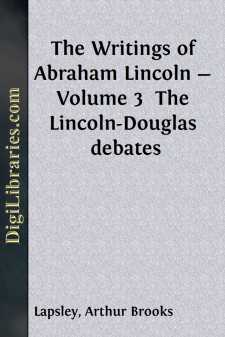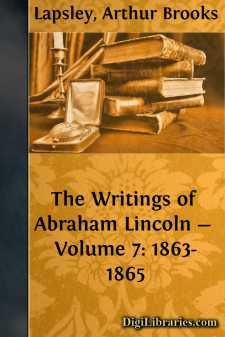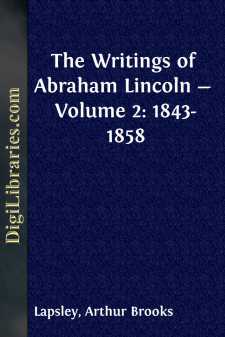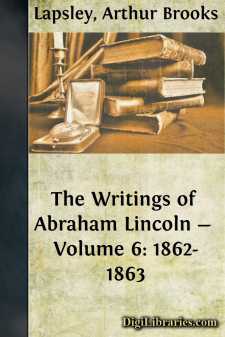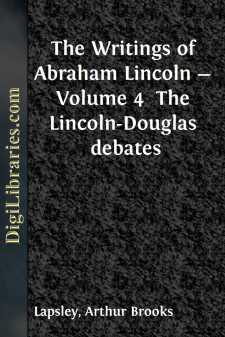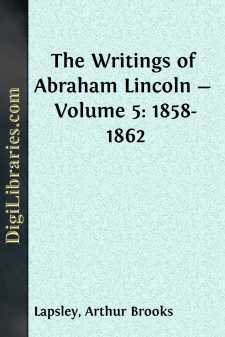Categories
- Antiques & Collectibles 13
- Architecture 36
- Art 48
- Bibles 22
- Biography & Autobiography 813
- Body, Mind & Spirit 142
- Business & Economics 28
- Children's Books 15
- Children's Fiction 12
- Computers 4
- Cooking 94
- Crafts & Hobbies 4
- Drama 346
- Education 46
- Family & Relationships 57
- Fiction 11828
- Games 19
- Gardening 17
- Health & Fitness 34
- History 1377
- House & Home 1
- Humor 147
- Juvenile Fiction 1873
- Juvenile Nonfiction 202
- Language Arts & Disciplines 88
- Law 16
- Literary Collections 686
- Literary Criticism 179
- Mathematics 13
- Medical 41
- Music 40
- Nature 179
- Non-Classifiable 1768
- Performing Arts 7
- Periodicals 1453
- Philosophy 64
- Photography 2
- Poetry 896
- Political Science 203
- Psychology 42
- Reference 154
- Religion 513
- Science 126
- Self-Help 84
- Social Science 81
- Sports & Recreation 34
- Study Aids 3
- Technology & Engineering 59
- Transportation 23
- Travel 463
- True Crime 29
The Writings of Abraham Lincoln - Volume 3 The Lincoln-Douglas debates
Categories:
Description:
Excerpt
THE LINCOLN-DOUGLAS DEBATES I
POLITICAL SPEECHES & DEBATES of LINCOLN WITH DOUGLAS In the Senatorial Campaign of 1858 in Illinois SPEECH AT SPRINGFIELD, JUNE 17, 1858
[The following speech was delivered at Springfield, Ill., at the close of the Republican State Convention held at that time and place, and by which Convention Mr. LINCOLN had been named as their candidate for United States Senator. Mr. DOUGLAS was not present.]
Mr. PRESIDENT AND GENTLEMEN OF THE CONVENTION:—If we could first know where we are, and whither we are tending, we could better judge what to do, and how to do it. We are now far into the fifth year since a policy was initiated with the avowed object and confident promise of putting an end to slavery agitation. Under the operation of that policy, that agitation has not only not ceased, but has constantly augmented. In my opinion, it will not cease until a crisis shall have been reached and passed. "A house divided against itself cannot stand." I believe this government cannot endure permanently half slave and half free. I do not expect the Union to be dissolved; I do not expect the house to fall; but I do expect it will cease to be divided. It will become all one thing, or all the other. Either the opponents of slavery will arrest the further spread of it, and place it where the public mind shall rest in the belief that it is in the course of ultimate extinction, or its advocates will push it forward till it shall become alike lawful in all the States, old as well as new, North as well as South.
Have we no tendency to the latter condition?
Let any one who doubts, carefully contemplate that now almost complete legal combination-piece of machinery, so to speak compounded of the Nebraska doctrine and the Dred Scott decision. Let him consider, not only what work the machinery is adapted to do, and how well adapted, but also let him study the history of its construction, and trace, if he can, or rather fail, if he can, to trace the evidences of design, and concert of action, among its chief architects, from the beginning.
The new year of 1854 found slavery excluded from more than half the States by State Constitutions, and from most of the National territory by Congressional prohibition. Four days later, commenced the struggle which ended in repealing that Congressional prohibition. This opened all the National territory to slavery, and was the first point gained.
But, so far, Congress only had acted, and an indorsement by the people, real or apparent, was indispensable to save the point already gained, and give chance for more.
This necessity had not been overlooked, but had been provided for, as well as might be, in the notable argument of "squatter sovereignty," otherwise called "sacred right of self-government," which latter phrase, though expressive of the only rightful basis of any government, was so perverted in this attempted use of it as to amount to just this: That if any one man choose to enslave another, no third man shall be allowed to object. That argument was incorporated into the Nebraska Bill itself, in the language which follows:
"It being the true intent and meaning of this Act not to legislate slavery into any Territory or State, nor to exclude it therefrom, but to leave the people thereof perfectly free to form and regulate their domestic institutions in their own way, subject only to the Constitution of the United States."
Then opened the roar of loose declamation in favor of "squatter sovereignty," and "sacred right of self-government." "But," said opposition members, "let us amend the bill so as to expressly declare that the people of the Territory may exclude slavery." "Not we," said the friends of the measure, and down they voted the amendment....


